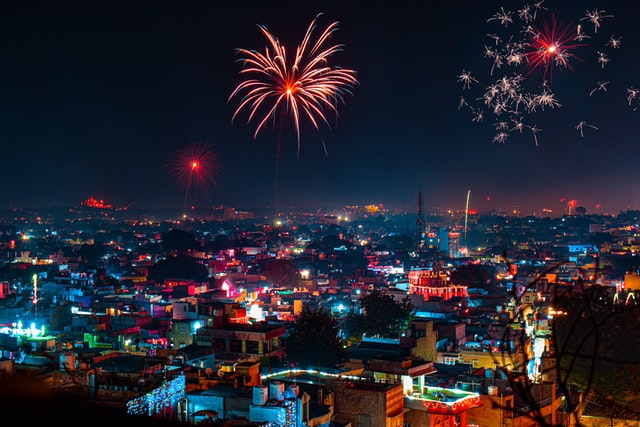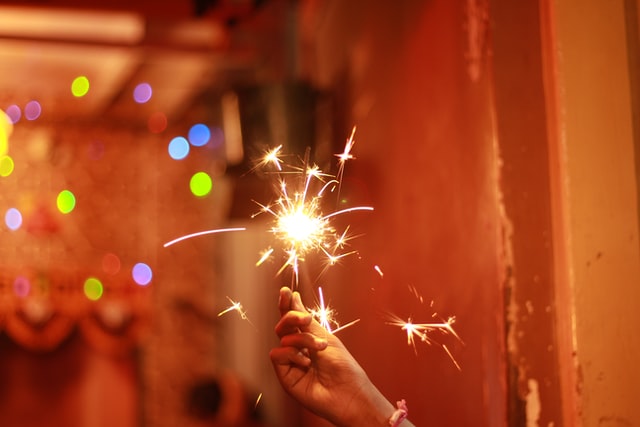There is no such festival as Diwali, as there is no such religion as Hinduism. Both are corruptions that came about when foreign entities were ruling India. The festival, the festival of lights, is correctly called Deepavali, in Sanskrit meaning a row of lights. That’s how it’s still called in the South of India. The religion is Sindhuism or the Vedic religion that flourished in the land on Sindhu, meaning water, the five rivers that flowed from the sacred mountains to the sacred ocean. Invaders who could not pronounce the word Sindhu correctly corrupted it to Hindu.
I am sure I am going to get flak for this, as I did for my blog on Dussehra, in which I called Ravana a hero and a devotee of Shiva, far different from the ten-headed evil monster he is made out to be.
Coming back to Deepavali, possibly the most enthusiastically celebrated festival in all parts of India, it’s again based on the good versus evil theme, in which a demon Naraka is destroyed by Krishna’s wife Satyabhama. It’s also celebrated as the day Rama ascends the throne of Ayodhya with Sita, twenty days after he emerges victorious against Ravana, on the Vijayadasami day. It’s also celebrated as a festival to Lakshmi, goddess of wealth, and for many business communities in India the day their business year begins with a puja (prayer) to Lakshmi.

Most of all, Deepavali is a festival for kids. Unfortunately, the lights are taken over by noise of the fireworks these days, not the beautiful ones that light up the sky in most parts of the world, including Disneyworld every night, but the obscene display of wealth by many Indians burning money in the name of bursting what they call bombs. These kill many every year, especially those who manufacture them, who are mostly women and children.
We have a wealthy neighbour who lays down a 300-meter long thread of these crackers on the public road, which when lit, blasts the neighbourhood with 150 or more decibels. A jet stream of noise for 15 minutes. Old people are traumatised. Our dog whimpers right through the days before and after Deepavali. The cost of one such firecracker can feed a few hundred people.

In Chennai where I grew up, it was different many decades ago. We were bursting with anticipation, negotiating a budget each year with our parents for the fireworks. These were mostly sparklers, flowerpots, rockets and such, with a few that made noise. That was one day we were happy to wake very early in the morning, around 3 am, have an oil bath and wear the new clothes that were bought specially for the occasion before we rushed out to light the fireworks, often unsupervised. At some point, mothers would summon the children to participate in the puja, and then to eat. It was the day to visit and be visited. The traditional greeting in Tamil on a Deepavali morning was ‘have you had your bath in the Ganges?’.
Many parts of India go berserk with the number of new clothes and jewellery they buy before Deepavali, and the amount of sweets they consume during the festival. In many parts of India, it’s obligatory to gamble during the Deepavali period. Purse strings loosen in the hope that the goddess of wealth will take care. It’s a day of cheer and bonhomie, rarely turning into revelry as some festivals turn into.

What should one remember on Deepavali day, in this day and age?
First of all, tolerance to all, irrespective of race, religion, caste, creed, and wealth, supplemented by compassion and generosity. Can we give to the less privileged as much as we spend on ourselves, in clothes, jewellery, fireworks, food, drink, sweets, and in gambling, if not all? Can we reduce the pollution of air and sound by limiting the obscene Son et Lumiere displays? Can we meet and greet one another in genuine empathy?
This was the message of all festivals of doing good not evil, to oneself, to one another, to dogs and other creatures, and to nature. Let’s remember why we are here, and be humane.



